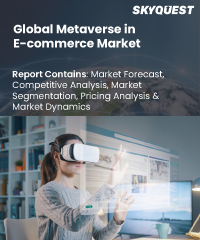
Report ID: SQMIG45A2183

Report ID:
SQMIG45A2183 |
Region:
Global |
Published Date: February, 2024
Pages:
157
|
Tables:
63 |
Figures:
75
Metaverse In E-Commerce Market Drivers
Growing adoption of virtual and augmented reality technologies
Increasing demand for online shopping
Rise of social commerce
Potential for new revenue streams
Potential for new business models
Metaverse In E-Commerce Market Restraints
Technology limitations
High development costs
Lack of standardization
Concerns around privacy and security
Regulatory and legal challenges
Our industry expert will work with you to provide you with customized data in a short amount of time.
REQUEST FREE CUSTOMIZATIONWant to customize this report? This report can be personalized according to your needs. Our analysts and industry experts will work directly with you to understand your requirements and provide you with customized data in a short amount of time. We offer $1000 worth of FREE customization at the time of purchase.

Report ID: SQMIG45A2183